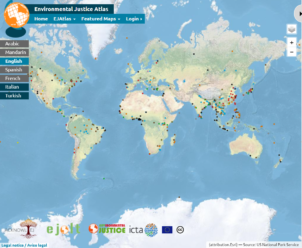
By Irmak Ertör
Available at the Journal of Peasant Studies
In the EJAtlas, as a whole, by November 2021 there are 134 cases of conflicts around the world on Fish and/or Shrimp as commodities. There are more in reality, not yet recorded. This brilliant article by Irmak Ertör (2021) in the Journal of Peasant Studies shows how fisher peoples are subjected to a wide range of injustices due to coastal and offshore investment projects and the inequalities embedded in the global capitalist marine economy. These injustices produce socio-environmental conflicts, studied and mapped in the EJAtlas. She describes and compares such conflicts while proposing a Blue Justice framework to understand their underlying causes and how fisher people confront injustices.
ABSTRACT
Fisher people and their communities around the world have been key social actors in seafood production and they are still feeding the world with about two-thirds of the catches destined for direct human consumption. However, they are subjected to a wide range of injustices due to coastal and offshore investment projects and the inequalities embedded in the global capitalist marine economy. These injustices are manifested through socio-environmental conflicts, which have been studied and mapped in the Environmental Justice Atlas (EJAtlas) together with other social actors’ resistances. This article examines 120 fisher folk conflicts that have been identified, documented and mapped in the EJAtlas, while proposing a Blue Justice framework to understand their underlying causes and how fisher people confront such injustices. As a grounded theoretical approach emerging from the scrutiny of fisher resistances and building on environmental justice, critical marine sociology and political economy literatures, the Blue Justice framework proposed here focuses on three dimensions: (i) material and biophysical dimension, (ii) spatial justice, and (iii) autonomy and sovereignty. In adopting this framework, this analysis reveals the blue layers of environmental justice by uncovering both the causes of conflicts faced by fisher communities and their political agency.

The project ENVJUSTICE has received funding from the European Research Council (ERC) under the European Union’s Horizon 2020 research and innovation programme (grant agreement No. 695446)